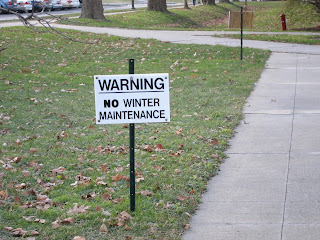It was a beautiful, cold, Ithaca Sunday morning. I was out walking when I spotted all these signs stuck in the grass. You know that song, “Signs,” famously covered and recorded by Tesla in 2007, originally recorded by Five Man Electric Band, “signs, signs, everywhere a sign,” well I did see some WARNING signs, and I was pretty floored.
· Are people supposed to safely navigate over snow and ice?
· Is the landlord not responsible to salt, clear, and maintain these areas?
· Especially with the knowledge that people are walking over these walkways and steps every day?
· Can a landowner negate their duty?
· Can a landowner put up signs (in advance of foreseeable weather) to negate (their obligation) to maintain safety?
A big wow because they cannot do any such thing. New York State Law is Clear:
What is a New York State’s Landowner (landlord’s) DUTY?
Indeed as the duty was so clearly stated in Smith v Arbaugh's Rest. (supra, p 100): "A landowner must act as a reasonable man in maintaining his property in a reasonably safe condition in view of all the circumstances, including the likelihood of injury to others, the seriousness of the injury, and the burden of avoiding the risk".
· How risky is it to walk up steep steps with no handrail?
· Risk of fracture is great.
· Slip, fall, and something is sure to break.
· Injuries to the knees, hips, backs, hands, and wrists from falling onto the sidewalk is not only likely but dangerous.
The Court in Smith continues by stating what this DUTY is:
Application of the single rule in the instant case exemplifies its good sense, for the duty of keeping the roads of Ice Caves Mountain in repair should not vary with the status of the person who uses them but, rather, with the foreseeability of their use and the possibility of injury resulting therefrom. While the likelihood of a plaintiff's presence had been an implicit consideration in the determination of status and the duty commensurate therewith, it now becomes a primary independent factor in determining foreseeability and the duty of the owner or occupier will vary with the likelihood of plaintiff's presence at the particular time and place of the injury. While status is no longer determinative, considerations of who plaintiff is and what his purpose is upon the land are factors which, if known, may be included in arriving at what would be reasonable care under the circumstances.
Is the state’s (governmental entity) DUTY different?
It is not disputed that when the State acts in a proprietary capacity as a landlord, it is subject to the same principles of tort law as is a private landlord (see Court of Claims Act, § 8; Preston v State of New York, 59 N.Y.2d 997, 998; Bass v City of New York, 38 AD2d 407, 411, affd no opn 32 N.Y.2d 894, supra; Duren v City of Binghamton, 172 Misc 580, affd 258 App Div 694, affd 283 N.Y. 467).
The difficulty here arises from defendant's dual role, where it has acted in a proprietary capacity as a landlord by its ownership and control of the SUNY campus, and also in a governmental capacity by providing police protection through the appointment of campus security officers "to preserve law and order on the campus" (see Education Law, § 355, subd 2, par m). A governmental entity's conduct may fall along a continuum of responsibility to individuals *512 and society deriving from its governmental and proprietary functions. This begins with the simplest matters directly concerning a piece of property for which the entity acting as landlord has a certain duty of care, for example, the repair of steps or the maintenance of doors in an apartment building. The spectrum extends gradually out to more complex measures of safety and security for a greater area and populace, whereupon the actions increasingly, and at a certain point only, involve governmental functions, for example, the maintenance of general police and fire protection. Consequently, any issue relating to the safety or security of an individual claimant must be carefully scrutinized to determine the point along the continuum that the State's alleged negligent action falls into, either a proprietary or governmental category.
"[I]n determining the extent and scope of the [State's] duties as a landlord, we must `distinguish those liabilities attendant upon governmental activities which have displaced or supplemented traditionally private enterprises' (Riss v. City of New York, 22 N.Y.2d 579, 581) and are performed in a proprietary capacity from those which are and have always been considered governmental in nature" (Bass v City of New York, 38 AD2d 407, 411, affd no opn 32 N.Y.2d 894, supra).
Signs aren’t going to negate your responsibility to the public. Signs aren’t going to negate your liability if someone gets hurt because you failed to adequately maintain safety. No, Signs aren’t going to let you off the hook if someone G-d forbid breaks something on a sheet of sidewalk ice.
Lawrence A. Newman, D.C., J.D.
607-229-5184
www.IthacaInjuryLawyer.com


No comments:
Post a Comment